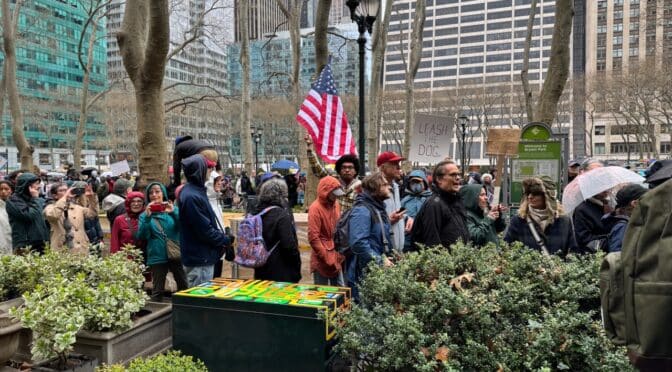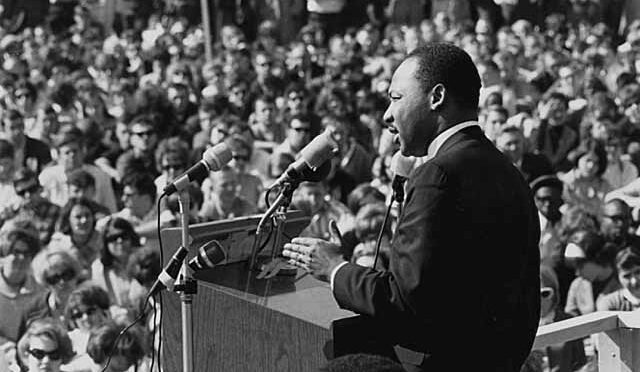Amadou Gueye raises his arm toward the ceiling and peels back the tape holding down the plastic. “It’s been like this for five months,” he says. The squarish hole, stuffed with bits of plasterboard, stares down at us. “It started leaking from the bathroom in the apartment above and my little boy was touching the water. I complained but they said I have to wait.”
But bigger problems dwarf the potentially dangerous ceiling leak. The family’s New York City Housing Authority (NYCHA) studio apartment on West 144 Street in Manhattan is just too small. Every corner, every surface, every corner of the room bursts with their possessions. Amadou Gueye’s family seems trapped in this 350 square foot studio apartment and trapped in NYCHA housing.
Amadou says he asked for a transfer to a larger apartment in 2009. Yet, NYCHA seems to have forgotten his family, leaving them in an apartment that is much too small. “I’ve always been told to wait. I’m on a waiting list. I’m tired of that. I’ve been going more than five times, back and forth to the office and the housing manager told me I have to wait,” he says, almost embarrassed.
 Two-year-old Muhammadou, neatly dressed in a striped Calvin Klein tank top, green shorts and sandals, looks like his 6’4″ dad’s Mini-Me. He tugs at his Amadou’s legs and grins showing all his tiny teeth. There’s almost no clearing for the toddler to play without bumping into his father or mother. His four-year-old sister Mame was sent to stay with family in Senegal because the apartment is too small to hold the four of them.
Two-year-old Muhammadou, neatly dressed in a striped Calvin Klein tank top, green shorts and sandals, looks like his 6’4″ dad’s Mini-Me. He tugs at his Amadou’s legs and grins showing all his tiny teeth. There’s almost no clearing for the toddler to play without bumping into his father or mother. His four-year-old sister Mame was sent to stay with family in Senegal because the apartment is too small to hold the four of them.
“When we talk to her, she says, ‘Dad, why you left me here? Are you mad with me, that’s why you left me here?’ She thought that we abandoned her,” he explains. It’s painful for him. They talk via video chat services, but he wants her home.
“We can not bring her back in this situation. We are waiting until we get a bigger apartment. School is going to open soon and we want to get her here.
Amadou first moved into the studio in June 2005. For a single man with a union job at a private midtown Manhattan club, the apartment was fine and convenient. Four years later, it still worked after he married and his wife came to New York from Senegal.
But the studio began to close in on them after Mame was born in 2010. By that time, his wife Djeumbe had her green card and she and Mame were added to the lease. Amadou also applied for a transfer.
NYCHA seemed indifferent to his request. He was told the computerized system would decide when and if he could have a transfer to a larger apartment in his building. He waited and waited and then after Muhammadou was born, he tried again. “Living in a studio with four people is not good for the welfare of the child,” he says.
A beige and brown sectional couch takes up about a quarter of the room. A big bed and dresser sit beside it. The galley kitchen is hidden behind the TV and a separate space for a child to sleep is curtained off in a tiny corner.
Amadou and his wife follow all the NYCHA rules and they try their best. But these conditions can strain any relationship. “We do everything in one room. My wife cooks in the kitchen, I sleep here, my son plays around here. It’s bad for my son,” he says.
Even when he works the nightshift, it’s a hardship. “They can’t do anything because they don’t want to disturb me while I’m sleeping,” he explains.
When we asked the obvious question about why he doesn’t look for an apartment outside of the NYCHA system, he dips his head and looks down sheepishly. He’s afraid of spending more on rent than he can afford. “If I go outside and I try to get a bigger apartment for $1500 or $1400, if I cannot afford it I may end up on the street. That’s what I’m upset about,” he says.
ConsumerMojo, on behalf of Amadou and his family, called Lucy Newman, a Legal Aid lawyer. She advocates for families in NYCHA apartments who need help. “It’s a nightmare,” she told us. “Very few families get transferred.”
Nevertheless, she asked Amadou to return to the office where he had filed his transfer request to learn the latest about his status. To his amazement Amadou discovered that his request was turned down. But no one in NYCHA had notified him.
It turned out Amadou’s $55,000 a year salary disqualifies him for an apartment for a family of four in the development where he now lives. The manager he spoke to told him he’d qualify for other NYCHA developments and gave him a list.
So Amadou picked another complex in Harlem and his computerized information, first filed in 2009, was updated.
“He said I will hear from them soon,” Amadou said hopefully. He knows that he is not alone in his quest. Although there are 178,000 NYCHA apartments, Legal Aid attorney Newman says, “There were only 100 transfers in 2013 through NYCHA’s developments.




It is sad to see that even after an overhaul change from the Bloomberg administration the same problem still exists in NYCHA. As a house owner it is landlord’s responsibility to take care of any leaks within the house, specially if there are tenant living there as it is stated in the Tenants Rights and Guidelines Booklet provided by the city. It is so hypocritical for the city to follow the rules but yet they can’t follow their own rules they set in place.
You’re absolutely right Antonio. The city doesn’t hold itself to the same standard as it uses for big and small private landlords.
This is a dire situation; this man and his family need better support from NYCHA. Five YEARS is too long to wait for a decision, let alone an UPDATE indicating the initial request was denied!!! Immigrants to the U.S. have their requests adjudicated faster… and that’s by the FEDERAL GOVERNMENT, the slowest animal in the public sector kingdom.
Thanks for the excellent job on investigating and following up with his situation which is not different from many New Yorkers out there, the system forgets about the hard working class that is fighting every day for a better future and that is just unfair, hopefully his family can be reunited again.